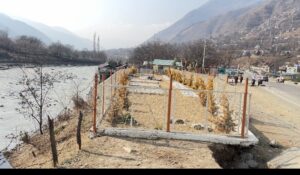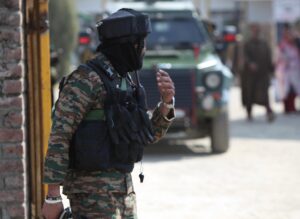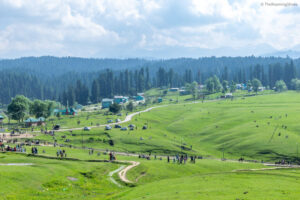In Kashmir, Love Is No Longer Blind. It Waits for a Govt Job

In the fields and drawing rooms of Kashmir, love has stopped taking chances. Once rooted in risk and poetry, it now demands pay slips, property, and a pension plan.
They say love is blind, but that’s hard to believe in a place where a boy’s heart is weighed by his job grade and a girl’s worth is measured in kanals.
Today, in Kashmir, love walks into living rooms not with flowers or poetry, but with a sealed envelope from the SSRB or a certificate from JKAS.
In a Budgam borough, where the breeze still smells of damp earth and sun-dried apples, I recently asked a mother about her son’s marriage plans. She smiled, almost apologetically, and said, “Woh abhi PSC ka intezaar kar raha hai. Pehle naukri lag jaye, tab baat aage badhegi.” He’s waiting for the Public Service Commission list. Only after that, she said, would they begin thinking about love.
This is no longer a personal worry. It’s the collective rhythm now.
In villages from Tral to Kupwara, in Srinagar’s well-lit drawing rooms and Budgam’s almond groves, the first question in any matrimonial conversation is not what kind of person, but what kind of job.
If it’s a government post, especially a permanent one, the rest follows easily.
Matchmakers across Kashmir are flooded with forms listing designations like “Junior Engineer (R&B),” “Veterinary Assistant,” or “School Lecturer (Education Dept.).”
One matchmaker in Hyderpora told me, “Agar ladka government job mein hai, uski demand teen guna zyada ho jaati hai. Baaki sab baad mein dekh lenge.” If the boy is in a government job, his demand triples. Everything else is secondary.
It wasn’t always like this.
In my own childhood, love arrived poetically, sometimes dangerously. It came as a poem folded into a book, or a smile exchanged near the bus stop.
Back then, even the idea of love had a sacred mischief to it. Families talked of kindness, simplicity, and the ability to share sorrow with dignity.
Today, that sorrow has been replaced by a fear far more pervasive: financial instability.
After decades of conflict, parents are haunted by their own youth. A father from Charar-e-Sharif told me, “Main chahta hoon meri beti ko woh sab na jhelna pade jo humne jhela. Agar dulha permanent hai, toh zindagi thodi aasan ho jaati hai.” I want my daughter to avoid the hardships we endured. If the groom is permanent, life becomes a little easier.
You can’t fault that reasoning. After all, it comes from loss. But somewhere along the way, the lines blurred.
Stability became the only virtue. The boy with the private startup, the girl with ambition to study abroad, or the artist who teaches local kids calligraphy began to vanish from the shortlist.
In downtown Srinagar, a young woman I met at a teacher training workshop said it plainly: “Main MA, B.Ed hoon. Lekin har rishta yahi kehta hai — naukri hai? Apne ghar ki property kya hai?” I hold a Master’s and a teaching degree. But every proposal still asks the same thing: Do you have a job? What’s your family property?
Social media has only amplified the performance.
Relationships today are lived online as much as in real life. One boy from Pulwama told me, “Agar profile acchi hai, photos classy hain, aur car bhi dikh rahi hai, toh ladki ka rishta aasan ho jaata hai.” If your profile looks polished, good photos, a car in the background, then it’s easier to find a match. It’s no longer about truth. It’s about display.
What’s lost in this parade is something tender and unquantifiable: The love that survives in waiting, letters unsent, and gestures that never ask for witnesses.
Even then, some resistance, though meek, persists.
A girl from Handwara told me how she refused a “secure match” because he mocked her poetry. “Woh naukri toh thi uske paas, lekin dil nahi tha,” she said. He had a job, but no heart. She chose to wait, and write.
There are still stories, though rare, that defy the prevailing order.
A Kashmiri government officer married a jobless boy who met her at an academic conference. Their families opposed, but they now live together, running a learning centre for displaced youth.
In these stories, you see the last embers of a love that chooses presence over prestige, and sees value in voice, not volume.
What we must ask ourselves now is whether we are raising a generation that will marry for possibility or for protection. Are we teaching our children that love is a leap, or a ledger?
If we keep choosing résumés over romance, we may forget the beauty of being understood, and truly waited for.
Perhaps love need not be blind. But it must stop squinting so hard at salary slips that it forgets how to look someone in the eyes.
It’s time we close the files, fold the bio-data forms, and remember: the most enduring love stories in Kashmir were never the ones with kanals or cars.
They were the ones with chaos, courage, and an honest cup of noon chai.
By Dr. Ashraf Zainabi This article is firstly published KO



